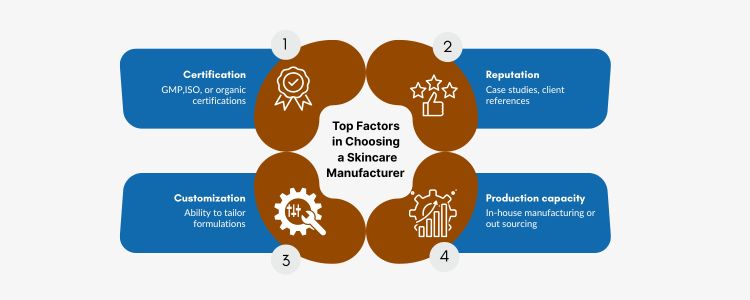Best Practices for Sourcing Private Label Skincare Products
The skincare business is evolving at a rapid pace, and consumer expectations are changing largely toward specialized, sustainable, and high-quality private label products. For both entrepreneurs and established brands, sourcing plays a significant role in consistency and competitiveness. As global supply chains develop, the global sourcing service is a critical partner in connecting businesses to reliable partners. This article will discuss best practices for sourcing private label skincare products including approaches to identify the right private label skincare manufacturer, as well as quality control, packaging, and sustainability.
1. Understanding the Private Label Skincare Landscape
Private label skincare has developed from a niche idea into a common strategy for beauty brands globally. It offers brands the opportunity to provide customized formulations without the capital investment in researching and developing new formulations and the expense of large production facilities. The biggest challenge is partnering with a manufacturer that can provide innovation, safety, and compliance with international regulations.
2. Choosing the Right Private Label Skincare Manufacturer
A reliable private label skincare manufacturer is the foundation of a successful skincare line. In addition to price, brands should consider formulation capabilities, production capacity, and adherence to worldwide safety standards. Manufacturers that can quickly adapt to the latest skincare trends, such as clean beauty or plant-based formulations,offer a competitive advantage.

3. Leveraging a Global Sourcing Service
Identifying appropriate private label skincare suppliers is essential, but there is a substantial due diligence process is required for it. The following are the components to evaluate:
- Certifications: Certifications from development and manufacturing practices (i.e., GMP, ISO) or organic certifications assure that the supplier adheres to international standards.
- Reputation: Case studies, client references, and overall market presence can be indicators of supplier legitimacy.
- Customizations: The ability to customize formulations, packaging, and branding is critical to offer a differentiated product in the market.
5. Prioritizing Quality Control
Without stringent quality control of private label skincare, it is easy for even the most sophisticated products to slip through the cracks. Effective quality control takes place at several stages of the manufacturing process. Each step should be product tested or evaluated from the quality check of raw materials through to the product packaging. Retail brands should request:
- Batch testing for allergens and stability.
- Absolute transparency in documentation for all ingredients.
- Regular checks (often referred to as factory audits) to ensure conformity.
All of the above ultimately protects brand trust with consumers and also protects against regulatory repercussions.
6. Sustainability and Eco-Friendly Sourcing
More and more, consumers of today are aligning their purchases with environmental quality. Incorporating sustainable sourcing practices, such as cruelty-free ingredient choices or biodegradable packaging, adds real value to a brand. In a cluttered marketplace, sustainability has gone from nice-to-have to a commitment to the brand for the long term.
7. Packaging as a Strategic Differentiator
The process of sourcing skincare packaging is not only about looks; it also involves communicating brand image, ensuring product safety, and consumer buying decisions. Investing in functional designs, airless pumps for sensitive products, or recyclable glass jars for premium creams has an optimistic effect on product desirability.
8. Regulatory Compliance in Global Markets
Each region has different regulatory standards for skincare. The European Union, for example, has rigorous safety assessments, while the United States requires compliance with FDA laws on accurate labeling. It is critical for brands to verify that their third-party partners are knowledgeable about these and other factors to reduce their risk of legal issues.
9. Cost Optimization Without Compromise
Cost still plays a critical role, but brands need to avoid equating cost and low price with sacrificing all quality. Effective and smart sourcing means negotiating for production discounts on volume, not finding countries that cheaply manufacture. It also means producing in the same region, with transparent costs from local suppliers that allow us to negotiate for high quality.
10. The Role of Innovation in Skincare Sourcing
Innovation begets long-tail growth. For example, suppliers undergoing research and development, whether it is around bio fermentation, probiotics, delivery systems, etc., will provide suppliers with a first-mover’s advantage. Brands can continuously evolve their product lines to meet diverse consumer expectations by sourcing suppliers who reflect managed innovation.
11. Building Long-Term Supplier Relationships
Despite the attractiveness of transactional space sourcing, buyers should invest in building relationships. When trust is built, the willingness to innovate is improved and developed, and can be executed with agility when the supply chain goes sideways.
12. Risk Mitigation in Global Sourcing
Geopolitical instability, trade policies, and pandemics create volatility in (particularly in global supply chains), which has heightened attention on the supply chain challenges and vulnerabilities. Brands should spread commodity suppliers across regions, keep safety stocks, and develop backup plans to avoid risk.
13. Digital Tools in Supplier Evaluation
The way we source goods has fundamentally changed due to technology. Virtual audits, AI-powered supplier assessments, and blockchain-based traceability are examples of new platforms that empower brands to evaluate their suppliers more accurately and effectively than ever before. This mitigates reliance on onsite inspections and provides heightened transparency.
14. Aligning Sourcing with Brand Positioning
Additionally, every player in the sourcing process must recognize that every sourcing decision must follow a brand’s positioning strategy. If a luxury skincare label searches for low-cost packaging, it will not only jeopardize its brand equity but also significantly risk credibility. Alternatively, with brands that value affordability, we need to ensure that they lean into finding cost-efficient sourcing opportunities.
15. Best Practices Checklist for Entrepreneurs
The following list of criteria makes decisions on sourcing much simpler for new skincare brands:
- Identify experienced and certified manufacturers.
- Choose suppliers who offer some degree of customization.
- Insist on suppliers taking responsibility for quality control.
- Prioritize sustainability in sourcing decisions.
- Use packaging that aligns with brand values.
- Ensure suppliers comply with international regulations.
- Use digital tools to help you evaluate suppliers.
Conclusion
Sourcing private label skincare products is both an art and a science, and to be successful, you have to balance cost-effectiveness with quality, sustainability, and innovation. By using a global sourcing service and working with a quality and trusted private label skincare manufacturer, brands can create a sustainable competitive edge in a crowded marketplace. Strategic sourcing is more than just a supply chain function; it is an integral part of your brand’s reputation and long-term success.
Frequently Asked Questions (FAQ)
Electronics, pharmaceuticals, renewable energy, and textiles will all be drivers.
India provides cost-effectiveness, skilled labor, and positive policy choices, making India a secure addition to global supply chains.
Textiles, pharmaceuticals, agro-processed products, and electronics.
Very competitive due to regulatory compliance, quality, and cost parity with similar products, and benefits from a tariff-free trade agreement.
Suppliers provide flexibility, scale, and reliability to global buyers and thus mitigate the supply chain disruption inherent in supply chain risks.
Great people, great policy, together with a variety of industry clusters.









